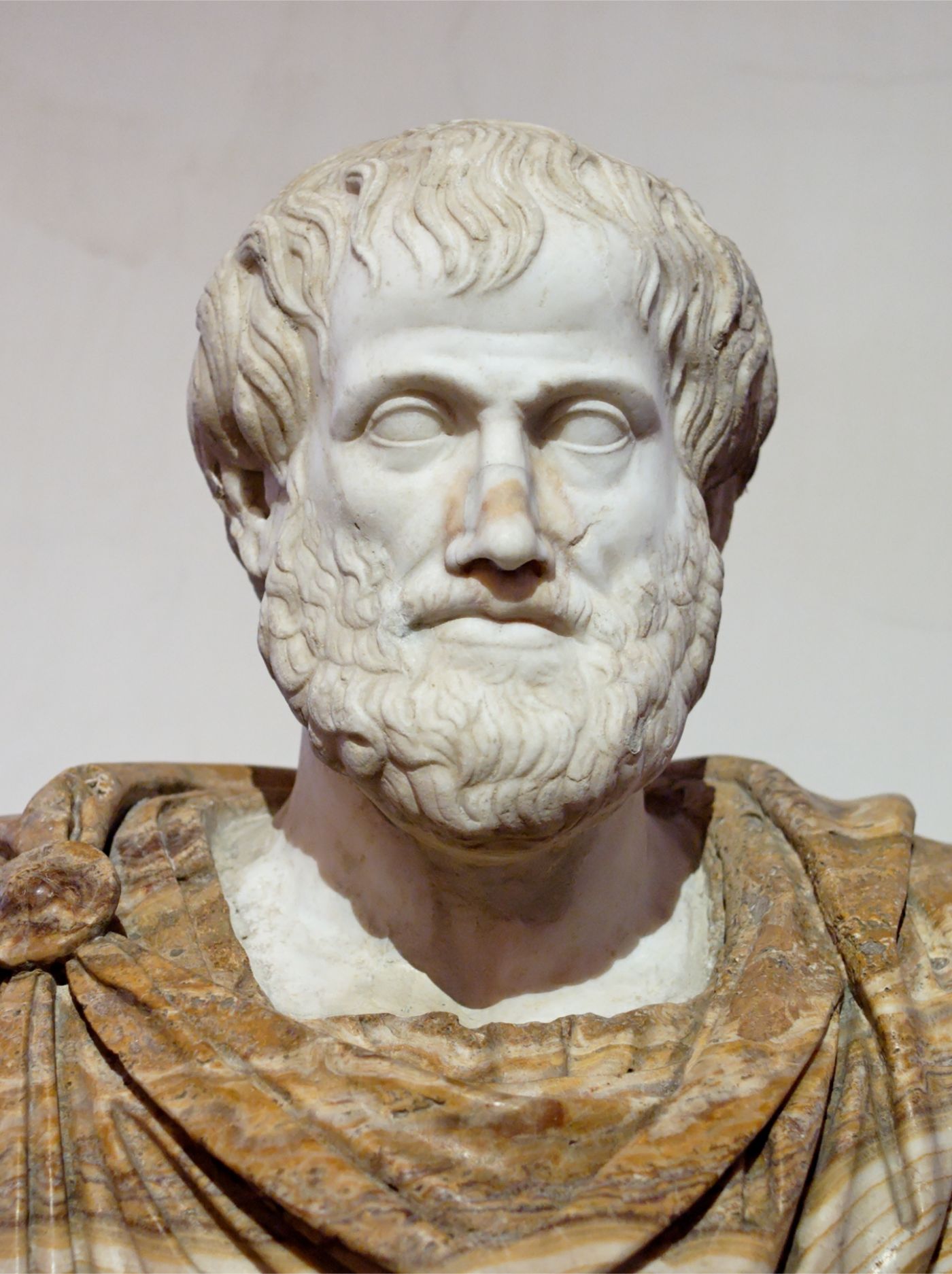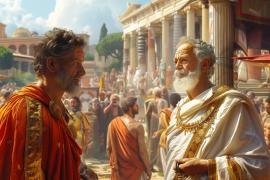
Aristotle

Aristotle's views and opinions on people and things
Aristotle's views and opinions have been foundational in shaping Western philosophy and influencing countless areas of knowledge. From his detailed examination of nature to his probing questions about human existence and governance, Aristotle's work has stood the test of time. Your exploration into his ideas invites you to a world where every detail of the cosmos and the intricacies of human society are pondered with great depth and insight.
Delving into Aristotle's philosophy, you'll discover his meticulous approach to understanding the world through empirical observation and logical reasoning. His contributions stretch from ethics, where he investigates the nature of the good life, to metaphysics, the study of being and substance. Aristotle offers a rich and complex system of thought, where each element—from biology to ethics to politics—is a piece in the larger puzzle of understanding reality and our place within it.
Summary
- Aristotle's deep-diving philosophy offers a comprehensive framework for understanding the world and human existence.
- His methodologies in logic and science underpin many modern disciplines, highlighting his enduring influence.
- Ethical and political theories presented by Aristotle continue to be pivotal in contemporary debates on morality and governance.
Life and Influence of Aristotle
Discover the journey of Aristotle, from his beginnings in Stagira to his enduring impact on the history of philosophy.
Early Life and Education
Aristotle was born in 384 BCE in Stagira, a small town on the northern coast of ancient Greece. His father was the personal physician to King Amyntas of Macedon, which allowed Aristotle to become intimately associated with the Macedonian court. You would find it fascinating that at the age of seventeen, Aristotle moved to Athens to join Plato's Academy, the preeminent place of learning at the time. His studies there greatly shaped his intellectual development.
The Lyceum and Scholarly Work
After leaving the Academy and with the support of Macedon's king Philip II, Aristotle founded his own school in Athens, called the Lyceum. Here, Aristotle conducted courses and extensive research, often walking as he taught—a method that led to his followers being dubbed "Peripatetics." At the Lyceum, you would observe that Aristotle was prolific in his writings, covering a wide array of subjects, from logic, metaphysics, and ethics, to biology, politics, and rhetoric.
Aristotle's Legacy
Today, Aristotle's influence extends far beyond Aristotelian teleology. His systematic approach to philosophical and scientific inquiry laid the groundwork for the Western intellectual tradition. His views on human nature have much to tell you about rationality and virtue. Moreover, his methodologies in logic and science continued to be taught well into the modern era, signifying an academic legacy that few have matched.
Aristotle's Philosophical Methodology
A key facet of Aristotle's approach involved the systematic observation of the natural world as a basis for knowledge. This methodological framework relied heavily on empirical evidence and logical analysis.
Empiricism and Observation
Aristotle observed that your understanding of the world should start from empirical evidence. This means he believed that knowledge comes from your sensory experiences. He applied this empirical approach across various fields, from biology to astronomy, advocating for the study of natural phenomena to gather insights.
Logic and Classifications
Your ability to reason and classify information was central to Aristotle's method. He developed a system of logic that included organizing concepts into categories, distinguishing between different types of relationships. Aristotle's contribution to classifications in the sciences helps you distinguish and relate various objects and ideas based on their innate characteristics and external relationships.
Metaphysics and Ontology
In Aristotle's thought, Metaphysics and Ontology are critical areas where he explores concepts like existence and reality. This section will focus on his interpretations of substance, form, matter, and the interplay between potentiality and actuality.
Substance and Essence
You'll find that for Aristotle, substance is central to understanding being. It refers to that which is individual and concrete, like an actual horse, in contrast to abstract qualities or quantities. Essence, on the other hand, defines what a thing is; it's the set of characteristics that make a substance what it uniquely is. Aristotle's exploration of substance and essence can help you grasp the foundational aspects of beings in his philosophical view.
Form and Matter
The dual concepts of form and matter are key to understanding Aristotle's philosophical world. Form refers to the defining qualities that give shape to matter. Imagine a statue: the shape of the sculpture is its form. Matter, in contrast, is the substance or material that takes on form. It's like the marble used in that statue. These two are always intertwined, with form realizing the potential of matter.
Potentiality and Actuality
Aristotle introduces the intriguing concepts of potentiality and actuality to describe how things change and what they can become. Potentiality pertains to the inherent capacity for change or growth—a seed's ability to become a tree, for instance. Actuality is the fulfillment of this potential—when the seed actually grows into a tree. Understanding this process sheds light on how Aristotle views the dynamic aspect of Metaphysics and the transition from what could be to what is.
Ethics and Moral Philosophy
Aristotle's contributions to ethics and moral philosophy have profoundly influenced the way you might think about right conduct and a good life. His studies culminate in texts such as the Nicomachean Ethics and the Eudemian Ethics, which offer deep insights into his theories.
The Concept of Virtues
Aristotle introduced the concept of virtues as the core elements of ethical behavior. You can think of virtue as a trait or quality that allows you to act in accordance with reason. Moral virtues like courage, temperance, and justice aren't just innate; they're habits that you develop through practice. Aristotle believed that by finding the mean between excess and deficiency in your actions, you nurture these virtues and thus lead an ethical life.
Virtue Ethics and Character
For Aristotle, your character is the bedrock of virtue ethics. It's about more than just doing the right thing; it's about being a good person. Building a good life hinges on developing a moral character through making virtuous choices consistently. This approach ties into Aristotle's perspective on free will, asserting that your actions and choices shape who you are as a person.
Happiness and the Good Life
The ultimate goal, according to Aristotle's philosophy, is achieving happiness, or 'eudaimonia.' Happiness for you isn't a passive state but the active exercise of virtue in a complete life. This happiness is contingent on living rationally and virtuously, not on externalities like pleasure or wealth. In pursuing the good life, you find happiness through flourishing and realizing your full potential as a human being. Your happiness isn't just an individual matter; it's also shaped by the society and the relationships you nurture throughout your life.
Political Theory and Social Thought
In navigating Aristotle’s extensive work, you’ll uncover that his reflections on political theory are deeply intertwined with his social thought. Key to understanding his philosophy is recognizing how he connects politics with the highest form of community.
Foundations of Political Science
Aristotle laid the groundwork for political science by presenting a methodical analysis of political systems. He regarded the polis, or city-state, not merely as a political unit but as the context for achieving human excellence. For him, political science wasn't just the study of states; it was the study of communities seeking the common good.
Types of Government
You may find Aristotle's classification of governments quite insightful. He identified three correct forms—monarchy, aristocracy, and polity—each with a deviant counterpart: tyranny, oligarchy, and democracy, respectively. To him, the stability and quality of the government depended on balancing the good of the community with the good of the individual.
Role of Citizens and Community
Aristotle emphasized the role of citizens as the soul of the polis; active participation in the community was vital for your flourishing and virtue. His vision saw not just a group of people living together, but a community sharing common goals, striving for a collective good that defines a just and prosperous society.
Contributions to Natural Sciences
Aristotle's groundbreaking work laid foundational concepts in natural sciences, particularly in physics and biology. His insights have shaped scientific thinking for centuries.
Aristotelian Physics
Aristotle's perspective on nature focused on the qualities of elements and their interactions. He argued against the idea of indivisible units of matter, or atoms, proposing instead that everything is composed of Earth, Water, Air, and Fire. These elements change into each other, explaining transformations in substances rather than through atomic arrangements. In dealing with the motion of objects, he postulated that the speed of free-falling objects is directly related to their weight, suggesting a heavier object falls more quickly because of its natural tendency to reach the center of the universe, which he believed was the Earth's center. While not accurate by modern standards, his views on free-falling objects set the stage for later corrections and developments in physics.
Biological Classifications and Studies
In biology, Aristotle made significant strides in species classification. He meticulously observed and documented various forms of life, categorizing them by shared characteristics and their environment. He looked at the nature of living things, dissecting animals and deducing their functions. His work in biology stands as one of the earliest attempts to systematically categorize living organisms, providing a framework that could be built upon by future biologists. His influence in this field is undeniable, ushering in a new methodology for observing and understanding the complexities of life.
Aristotle's Works on Logic and Rhetoric
In your exploration of philosophical history, you’ll discover that Aristotle made significant strides in the realms of logic and rhetoric. His texts on these subjects have profoundly influenced Western thought for centuries.
Organon and the Development of Syllogism
Organon, a collection of Aristotle’s six works, lays the foundation of classical logic. Within these texts, he introduces the syllogism—a form of reasoning where a conclusion is drawn from two given or assumed propositions (premises). Each premise shares a common term with the conclusion, creating a deductive link. For instance, if 'all humans are mortal' and 'all Greeks are humans,' then 'all Greeks are mortal'. This logical structure is your key to unlocking the basics of deductive reasoning—a key component to knowledge acquisition.
Art of Rhetoric and Persuasion
Aristotle’s contributions to rhetoric are encapsulated in his work titled Rhetoric, which discusses the art of persuasion. He argues that rhetoric is a counterpart to logic and not merely a tool to win arguments. Rather, it’s a means of reasoning that helps you influence and motivate others through language. By identifying three modes of persuasion—ethos (credibility), logos (logical appeal), and pathos (emotional appeal)—you can better craft your arguments and communicate more effectively.
Influence on Various Disciplines
Aristotle's profound impact has permeated various disciplines, integrating philosophy with the arts, sciences, and beyond. His views have constructed the foundational concepts of many modern fields.
Impact on the Arts and Literature
Aristotle's exploration of arts like poetry and drama has established significant aesthetic principles. His perspective on art communicates universal truths, moving beyond simple imitation to convey deeper realities. In literature, these concepts have influenced narrative structures and character development. The critical role of art in educating and shaping ethics is a testament to his enduring influence on the arts. Similarly, his thoughts on music underscore its educational importance and capacity to mold character, suggesting that even today, music's role goes far beyond entertainment.
Legacy in Modern Philosophy and Science
In philosophy, Aristotle is noted for his empirical approach, which has informed modern scientific methods, and his contributions to logic form the basis for scientific reasoning. Fields such as psychology and medicine still draw on his ideas. His insights into human nature and ethics have laid the groundwork for philosophers like Hobbes and educators throughout history. In the realm of science, Aristotle's influence spans from biology to astronomy, even as his methods inspired more refined approaches in the natural sciences. The education system we recognize today reflects his belief in knowledge fostering public virtue, as he emphasized in his own works on education. His legacy continues to be pivotal, bridging the gap between educational ideologies and practical instruction methodologies.
Criticisms and Interpretations
Aristotle's philosophies have been rigorously analyzed and interpreted through the ages, leading to a diverse spectrum of viewpoints. Your understanding of this will deepen as you explore how Aristotelian thought has been both lauded and critiqued over time.
Aristotelianism through the Ages
The intellectual footprint of Aristotle has traversed various epochs, shaping and shifting within each. In the realm of literary criticism, Aristotle's ancient analysis of tragedy in "Poetics" sets the foundation for how literature is evaluated—an aspect that still resonates with many modern critics. His emphasis on catharsis and the elements of tragedy remains significant in understanding classical works. Interestingly, his promotion of the practical functions of literature marked his counter to Plato's criticisms of the art form.
In the Middle Ages, the robust intersection of Aristotle's work with Christianity by philosophers like Thomas Aquinas led to what we now call Scholasticism, showcasing a harmonization of Aristotelian logic with religious doctrine. Yet, even with this integration, there were contentions about the applicability of his works, with some critiques focusing on the secular nature of his methodologies.
Contemporary Views on Aristotle
Fast forward to the modern philosophy landscape, and you'll notice that Aristotle's concepts are often at the heart of new interpretations. The scrutiny of Aristotle's metaphysics has evolved, especially concerning his substance theory, which holds form and matter as both distinct and interrelated. This idea of hylomorphism, despite its historical roots, continues to generate intellectual discourse given its relevance in current issues like the mind-body relationship.
Moreover, modern reimaginings of Aristotelian ethics highlight how his virtue-centric approach can be adapted to contemporary societal norms, encouraging a dialogue between ancient wisdom and present-day moral complexities. Critics, however, may question the universal applicability of his ethical framework, arguing that societal changes necessitate a re-examination of these ancient principles.
All articles






End of content
No more pages to load
